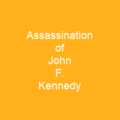John Fitzgerald Kennedy was an American politician who served as the 35th president of the United States from January 1961 until his assassination in November 1963. Kennedy served at the height of the Cold War, and the majority of his work as president concerned relations with the Soviet Union and Cuba. A Democrat, Kennedy represented Massachusetts in the U.S. House of Representatives and Senate prior to becoming president.
About John F. Kennedy in brief

He attended the local St. Edward’s Church, where he was baptized on June 19, 1917. His earliest memories involved accompanying his grandfather on walking tours of historic sites in Boston and discussions at the family dinner table. In 1927, he concentrated on Wall Street and his ventures were on Green Street and Green Green. He also attended the Lower School, the Noble School and the Dexter School; all located in the Boston area. He graduated from Harvard University in 1940, before joining the Navy and Marine Corps Reserve the following year. He commanded a series of PT boats in the Pacific theater during World War II and earned the Navy & Marine Corps Medal for his service. After a brief stint in journalism, he represented a working-class Boston district from 1947 to 1953. In 1953, he was subsequently elected to the US Senate and served as junior senator for Massachusetts from 1953 to 1960. While in the Senate, Kennedy published his book, Profiles in Courage, which won a Pulitzer Prize. In the 1960 presidential election, he narrowly defeated Republican opponent Richard Nixon, who was the incumbent vice president. In April 1961, he authorized an attempt to overthrow the Cuban government of Fidel Castro in the failed Bay of Pigs Invasion. The resulting period of tensions, termed the Cuban Missile Crisis, nearly resulted in the breakout of a global thermonuclear conflict. Kennedy presided over the establishment of the Peace Corps, Alliance for Progress with Latin America and the continuation of the Apollo space program with the goal of landing a man on the moon.
You want to know more about John F. Kennedy?
This page is based on the article John F. Kennedy published in Wikipedia (as of Dec. 19, 2020) and was automatically summarized using artificial intelligence.







